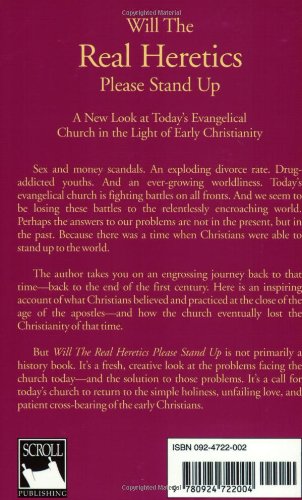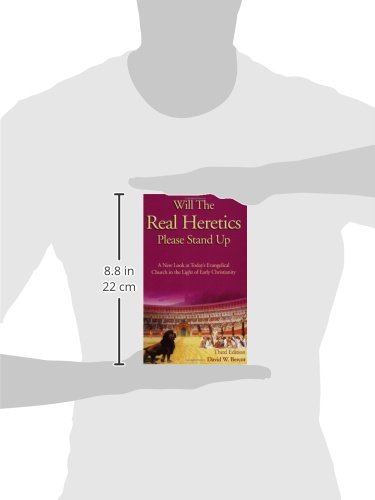Customer Services
Copyright © 2025 Desertcart Holdings Limited




Will the Real Heretics Please Stand Up: A New Look at Today's Evangelical Church in the Light of Early Christianity
K**R
Eye-opening and challenging
If you choose to read this book (and I recommend that you do), please read the entire book until the very end. You will be challenged, you will be humbled, you will learn and grow, you may get upset or angry, you will be changed.Take the time and make the effort to examine and work through the arguments made in the book. Reflect and read and pray. Be and remain open minded. If you persevere to the end, you will gain insight.
C**L
Early Christianity was not like today
This comes across as an honest approach to understanding religious belief and practices. Going back to the second and third century church writers us illuminating. Viewing the evolution of "improvements" in Christian belief and practice through the eyes of history and the early writers brings shame on Christian leadership who became self-centered, power hungry, and often devoid of conscience and deference to apostolic teaching and scripture. This will make most any reader reevaluate what and why they believe.
R**Z
Great book to read about what early Christians were like!
I borrowed this book over 20-years ago and got to read about four chapters before I had to give it back. I'm glad that I have it for myself and have already read half of the book since it arrived a few days ago. Being called a Christian back then was a matter of life and death. You'd find out how much of a Christian you really were back then.
B**G
A look into Early Christianity ,through tainted Protestant lens ..
“Will the real heretics please stand up “attempts to bring the reader back in time with what Early Christianity was like .I state “attempts “because the author selectively touches on topics of what the Early Church taught and practiced ..He does quote some Early Church Fathers,but he fails to mention some of the most critical Theological Teachings of the Early Church..Such as the belief in the Real Presence of Christ in the Eucharist,the Sacraments ,the Role of the Bishop of Rome ,etc ..Obviously the author is trying to avoid the fact the Early Church was 100% Catholic .Any elementary attempt to study Early Church History would quickly make one realize the Early Church was Catholic ..Any “scholar “with integrity (Catholic or Protestant)should be honest with their scholarship,no matter what their theological leanings are ..The author of this book is not 100% honest ..
J**M
Immense challenge
Most of this book was an incredible challenge to me. I read It and thought, Lord, have mercy on me, a sinner.It's making me reconsider some of my own views, even as a fundamentalist.Thank you, Mr Bercot
K**I
Great beginners book on the early church
Got this today and read through a few chapters (from the back of the book). Good information and a good book to start you on a quest of reading the early church fathers... I dont often read the Word for its literal content as much as its deeper meaning thru the Holy Spirit teaching/leading -so I dont agree with everything in the book - but great read for those wanting to know more about the early church and the men that followed soon after--and how the church began being corrupted by the world.
M**P
You won't be disappointed with this book!
Sometimes we were reading basic things which we already knew. Then would come those special gems. Now that I want to desperately purchase the hard copy it's not available. I read it on my kindle. The suffering pacifist Christians - a new view; i.e., was this the reason the "Pax Romana" (Roman peace) lasted an unusually long time? This was a fresh look at an issue which we still deal with 2,000 years later; conscientious objectors.
D**Z
Good
Great intro to the topic. I look at the ‘conversion’ of the Roman Empire and Constantine a little differently. While there were changes in some points, I think the post-Constantine Church a realistic picture of the growth of the Church. The Church has grown and converted many, and now that is has more “temporal” power, what did she do that was successful and what that needing improvement? It would have been a keener insight to consider the different between proper development as opposed to innovation that contradicted previous dogma. I recommend the book.
A**R
Very Informative and Highly Recommended
The author of this book is a Latter Day Saint who doesn't know it. (There are a lot of them around). I enjoyed the book immensely, and would love to have a long discussion with Mr Bercot. I made copious notes, highlighting the parallels between the Church of Jesus Christ of Latter Day Saints and the early/primitive Church of the original Apostles.Amazingly the word Mormon or Mormonism is not mentioned once among the many churches that taught things that resembled the teachings of the early church (anabaptists etc.) I say amazing because the Restored Church of Jesus Christ resembles the original Church in so many more ways than any of the others, as of course it should, being a restoration of all that was lost during the apostasy.Unfortunately, Mr. Bercot, like so many Conventional Christians today, is totally fixated upon the fact that no-one, including God Himself, can add to the canon of scripture, the Bible.For anyone open minded enough to dig deeper, I recommend "Offenders For A Word" by Daniel Peterson. It can be read online for free at Farms - Neal A Maxwell Institute.I challenge any Christian to read it and still say we are not Christians.Congratulations, Mr. Bercot. Very enjoyable and honestly written (apart from not giving the Latter Day Saints perspective a fair hearing).
B**N
One of the most challenging books I have read
If you are an evangelical and feel like you need a good dressing down as you grow in your faith (as I was/still am) read this book. Absolutely fantastic, seriously challenging, one of the best Christian books I have ever read. Also started Paul Pavao's websites. Littler known chap, do check him out
A**R
Three Stars
A sincere call to the Church Universal from an evangelicals heart.
E**E
fast delivery
very informative
H**S
A blinkered understanding
Bercot is right in saying that modern evangelicalism is a million miles from the faith of the early Christians, but his own understanding of the faith and practice of the early church is very biased and selective. He still seems to want to believe that the earliest church was non-structural and non-dogmatic, whereas Andrew Louth is more correct in stating that by and large the early Christian writers would have "had little patience for the modern demand for religion without dogma".Bercot claims (in the notes) that "The church of the third centure was more tightly structured than that of the second. Also, the role of the bishop had grown in importance". Yet as early as 110ad Ignatius was telling the cogregations to "do NOTHING without the bishop" and "submit yourselves to the bishop as to Christ...this is necessary if justification is to be yours in full measure". So clearly Bercot's claim is at least exhaggerated, if not downright erroneous. (No wonder he only quotes Ignatius twice in the entire book, despite Ignatius having a relatively large surviving corpus of letters, as they are replete with emphases on the importance of the role of the bishop).If anybody wants to get a real understanding of what the pre-nicene church practiced and believed, better to hear it from the horses mouth. Grab a copy of the far more informative "The Faith of the Early Fathers - Volume 1" by William Jurgens, where the interpretational prose is limited to the end-notes.
Trustpilot
2 months ago
2 months ago